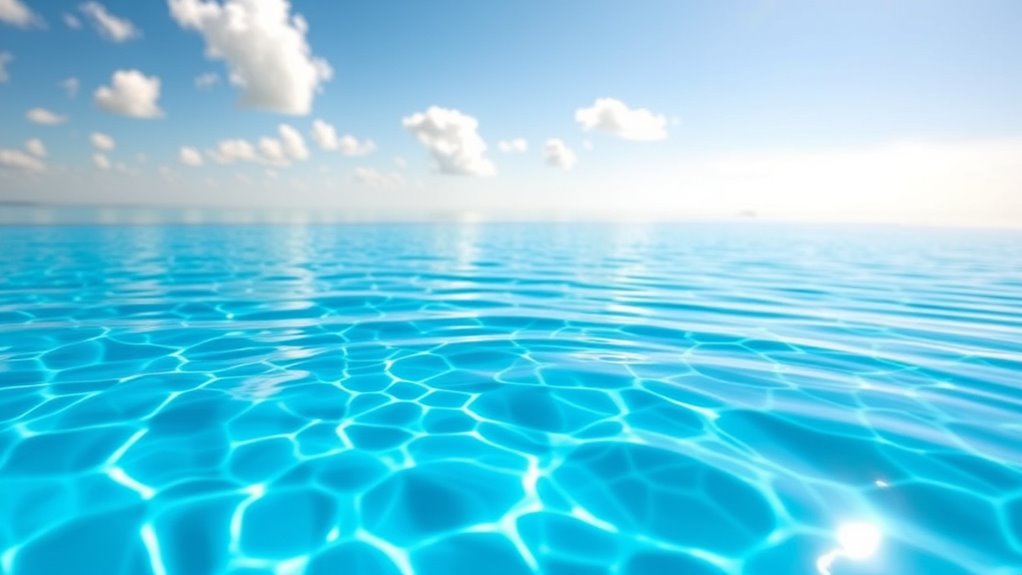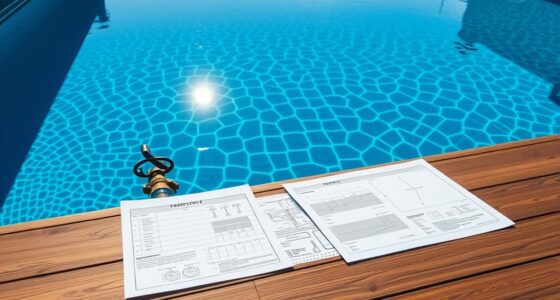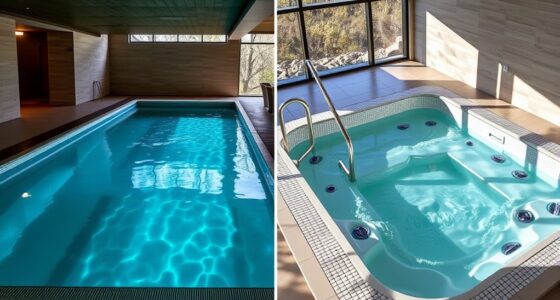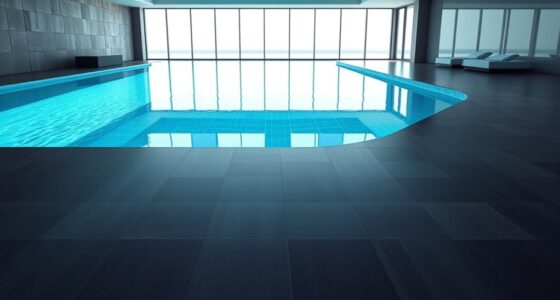Choosing between chlorine, salt, or UV for your Endless Pool depends on your maintenance preference and eco-care goals. Chlorine is affordable and simple but requires regular testing and handling chemicals. Salt systems generate chlorine automatically, offering softer water and less fuss, while UV sterilizers use light to kill bacteria without chemicals. Each option has benefits, and if you want to discover which suits your pool best, there’s more to explore below.
Key Takeaways
- Chlorine is cost-effective but requires regular chemical handling, while salt systems offer automatic chlorine production with less maintenance.
- UV sterilizers provide chemical-free water treatment but often need pairing with other systems for complete sanitation.
- Salt systems are eco-friendly, producing fewer harmful byproducts and offering softer, more comfortable water.
- UV systems consume less energy and are low-maintenance but don’t provide residual disinfectant, so they’re often combined with other methods.
- Choose based on your maintenance preference, budget, environmental goals, and whether you want chemical-free or traditional water care.
Understanding Chlorine: The Classic Water Care Choice
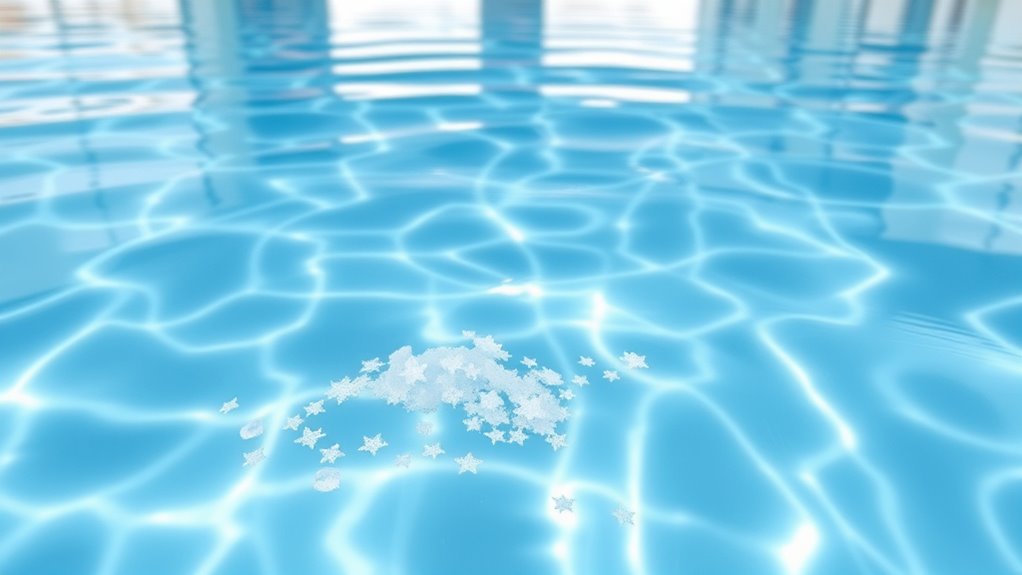
Chlorine remains the most popular and trusted method for keeping pool water clean and safe. It effectively kills bacteria, algae, and other harmful microorganisms, ensuring your pool stays clear and hygienic. When you add chlorine, it forms a disinfectant that continuously fights contaminants as water circulates. You can choose from various forms, like liquid, tablets, or granules, to suit your maintenance routine. Proper dosing is essential; too little won’t disinfect properly, while too much can cause skin irritation and strong odors. Testing your water regularly helps maintain the right chlorine levels, typically between 1 and 3 parts per million (ppm). Overall, chlorine provides a reliable, cost-effective solution for keeping your pool water safe and inviting for swimmers.
Salt Systems: A Modern Alternative for Easy Maintenance

Salt systems offer a convenient alternative to traditional chlorine methods, simplifying pool maintenance while keeping your water clean and safe. Instead of manually adding chlorine, you install a salt generator that produces chlorine automatically through electrolysis. This process results in softer, more comfortable water and reduces the strong chemical smell often associated with chlorinated pools. Salt systems require less frequent chemical adjustments, saving you time and effort. You simply add the appropriate amount of salt, and the system maintains consistent sanitizer levels. Additionally, salt systems tend to be gentler on your skin, eyes, and pool surfaces. They are also often integrated with advanced Pimple Patch technology for targeted skin treatment after swimming. Overall, they provide a hands-off approach to keeping your pool water clear, sanitized, and inviting, making pool ownership more enjoyable and less labor-intensive.
UV Sterilization: Using Light to Keep Your Pool Clean
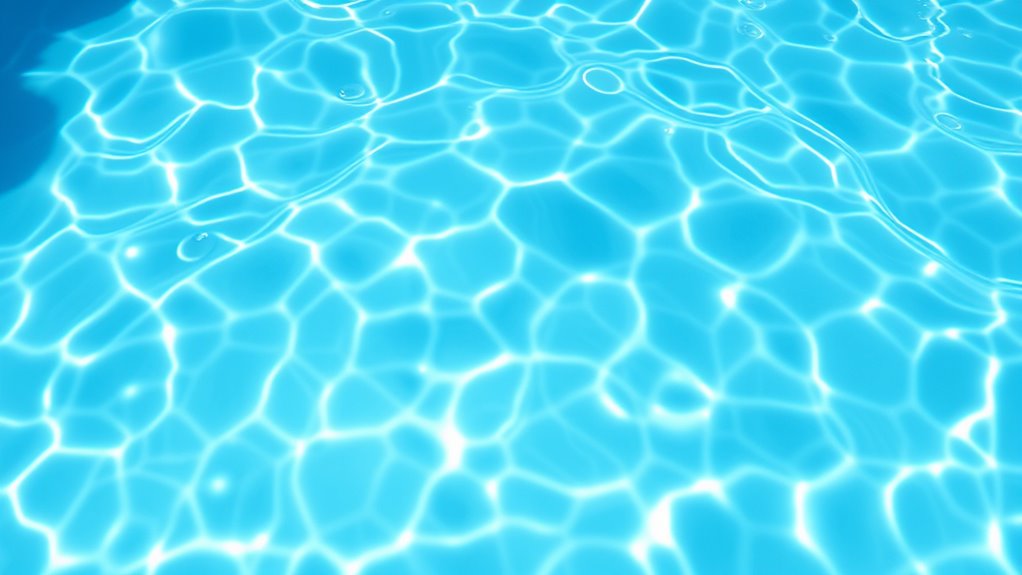
UV sterilization uses ultraviolet light to kill bacteria and algae quickly and effectively. It reduces chemical use and keeps your pool water clearer and safer. Understanding how UV works and its benefits can help you decide if it’s the right choice for your pool maintenance. Additionally, UV systems are increasingly integrated with other automation technologies to improve overall pool management automation in business.
How UV Works
Ever wondered how UV sterilization keeps your pool crystal clear? It works by exposing water to ultraviolet light, which destroys bacteria, viruses, and algae at a cellular level. As water flows through the UV sterilizer, the light penetrates cell walls, disrupting their DNA and rendering them inactive. This process happens quickly, so contaminants are neutralized almost instantly. UV sterilization doesn’t add chemicals or alter your pool’s pH, making it a chemical-free way to improve water quality. The system is typically installed inline, meaning water continually passes through the UV chamber as part of your circulation system. This constant treatment keeps your pool water clean without the need for frequent chemical adjustments or manual cleaning, giving you clearer, safer water with minimal effort. Knowing that UV sterilization is an effective method supported by regional resources and tools can help you make informed decisions about your pool maintenance.
Benefits of UV Sterilization
Using ultraviolet sterilization offers several advantages for maintaining a healthy pool. It effectively destroys bacteria, viruses, and algae without the need for harsh chemicals, helping you keep your water safe and clear. UV systems work quickly, providing immediate disinfection as water passes through the unit. This reduces your reliance on chlorine or salt, which can cause skin irritation or strong odors. UV sterilization also minimizes chemical by-products, making your pool environment more eco-friendly. Additionally, UV systems require minimal maintenance once installed, saving you time and effort. Because UV light targets microorganisms directly, your pool’s sanitizer levels stay balanced, preventing overuse of chemicals. Moreover, some models are compatible with various pool setups, enhancing their versatility. Overall, UV sterilization is a safe, efficient way to keep your pool water pristine and inviting.
Comparing Costs and Effort for Each System
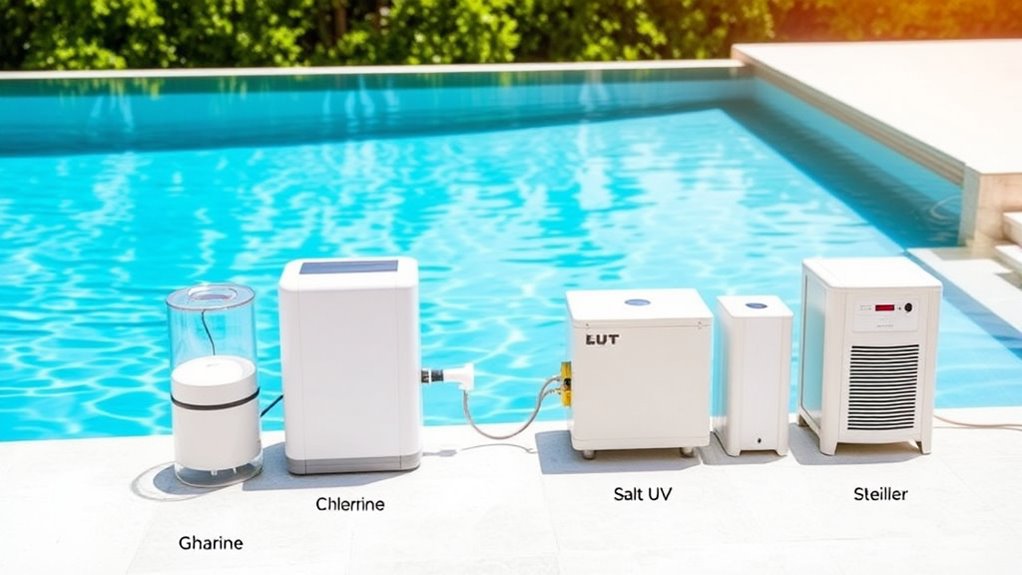
When choosing a pool water care system, you’ll want to take into account the initial costs, ongoing maintenance, and how easy it is to operate. Some systems require a larger upfront investment but need less maintenance, while others may be simpler to run day-to-day. Comparing these factors helps you find the right balance for your budget and effort level. Regular inspection and maintenance of bicycle tires can extend their lifespan and ensure safety, similar to how monitoring pool equipment is essential for proper water care.
Initial Investment Expenses
Comparing the initial costs of different pool water care systems reveals significant differences in both expense and effort. With chlorine systems, you typically pay less upfront, since basic chlorination equipment is affordable and widely available. Saltwater systems require a higher initial investment, mainly for the salt chlorine generator and installation. UV systems tend to fall in the middle but can vary based on size and features. When considering costs, keep in mind:
- Salt generator price and installation
- UV sterilizer costs and setup
- Necessary accessories or upgrades
- Potential need for professional installation
While salt and UV systems have higher initial costs, they often reduce ongoing expenses and maintenance effort over time. Your choice depends on balancing upfront investment with long-term convenience. Outdoor kitchen planning can help you optimize your setup for efficiency and ease of maintenance.
Maintenance and Supplies
After investing in a pool water care system, maintaining it efficiently becomes a key factor in long-term satisfaction. With chlorine systems, you’ll need to regularly buy chlorine tablets, test strips, and shock treatments, which can add up over time. Salt systems require initial salt purchase and occasional replacement, but salt is generally inexpensive. UV systems demand minimal consumables—mainly replacement bulbs and quartz sleeves—reducing ongoing costs. Chlorine systems may require more frequent chemical balancing and monitoring, increasing effort. Salt systems often need less daily attention but occasional salt level checks. UV systems are low-maintenance but require periodic bulb replacements. Overall, chlorine pools tend to have higher ongoing supply costs, salt pools offer moderate upkeep, and UV systems are the simplest and most cost-effective long-term. Proper maintenance is essential to ensure the longevity and efficiency of each system.
Operational Simplicity
Choosing a pool water care system largely depends on how much effort and cost you’re willing to invest over time. Salt systems typically require minimal daily maintenance, with the convenience of automatic chlorine production. UV systems are straightforward but may need occasional bulb replacements and flow checks. Chlorine systems demand regular handling, dosing, and monitoring, which can be more labor-intensive. Consider these factors:
- Salt systems offer long-term cost savings with less daily effort
- UV systems are low-maintenance but rely on power and bulb replacements
- Chlorine systems need frequent handling and precise dosing
- Overall operational costs vary based on energy usage and supply needs
- Understanding the fundamentals of sound design can help you better evaluate the noise levels and operational sounds of each system.
Assess your willingness to perform daily tasks versus periodic maintenance, and choose a system that balances effort with your budget.
Safety Considerations and Potential Impacts on Your Pool
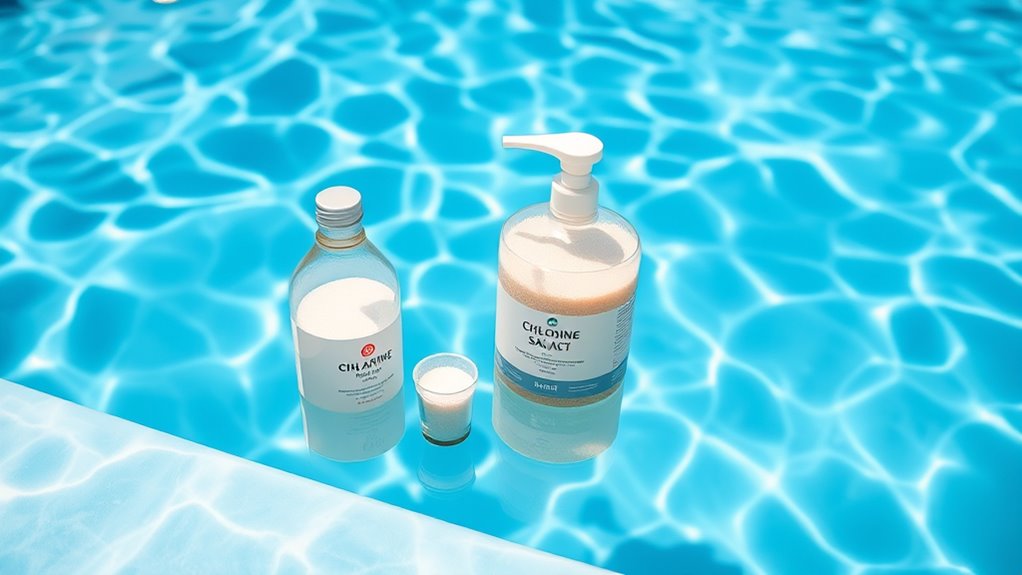
Ensuring safety while maintaining your pool is essential because improper practices can lead to accidents or damage. When using chlorine, handle chemicals carefully, store them securely, and follow manufacturer instructions to prevent leaks or exposure. Salt systems produce chlorine through electrolysis, so ensure proper installation and maintenance to avoid corrosion or electrical issues. UV systems use ultraviolet light to disinfect; avoid direct exposure to UV lamps to protect your skin and eyes. Overuse or incorrect application of any method can cause skin or eye irritation, or damage pool components. Regularly check your equipment and water chemistry to guarantee safe operation. Additionally, understanding the water chemistry balance is crucial for maintaining a safe and healthy swimming environment. Being mindful of these safety considerations helps prevent accidents, prolongs your pool’s lifespan, and keeps your swimming environment safe and enjoyable.
Environmental Benefits of Different Water Care Options

Different pool water care options vary in their environmental impact, with some methods offering more sustainable choices than others. For example, salt systems generate fewer chemical byproducts and often reduce the need for harsh chemicals, lowering chemical runoff. UV systems use minimal energy and avoid chemical use altogether, making them highly eco-friendly. Traditional chlorine pools, however, can produce harmful chlorinated compounds and require frequent chemical purchases, increasing waste. Additionally, selecting environmentally conscious options can contribute to community engagement and promote broader awareness of sustainable practices.
- Salt systems produce fewer chemical residues and reduce transportation emissions.
- UV sterilizers consume less energy compared to traditional chlorination.
- Chlorine pools generate chemical waste and require regular chemical refills.
- Choosing eco-friendly maintenance can help conserve water and reduce chemical runoff, supporting your pool’s environmental footprint.
Tips for Choosing the Best Water Care System for Your Endless Pool
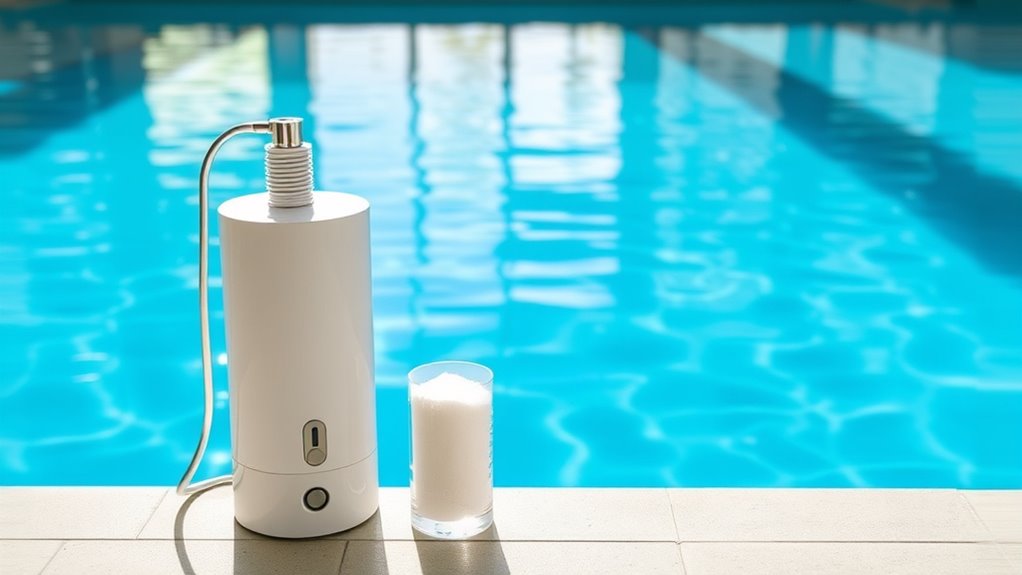
Selecting the right water care system for your Endless Pool depends on your priorities, budget, and environmental concerns. First, consider how much maintenance you’re willing to do. Salt systems typically require less frequent testing and handling, making them convenient. UV systems offer chemical-free sanitation but often need to be paired with other treatments like salt or chlorine. If you prioritize eco-friendliness, salt systems usually produce fewer chemical byproducts and are gentler on skin and eyes. Budget-wise, initial costs vary: UV systems are often more affordable upfront, while salt systems may have higher installation costs but lower ongoing expenses. Think about your comfort level with chemicals and your pool usage frequency. Weigh these factors carefully to choose a system that fits your lifestyle and values.
Frequently Asked Questions
Can These Systems Be Combined for Optimal Water Quality?
Yes, you can combine these systems for better water quality. Using a salt system with UV sterilization, for example, provides a dual approach: salt keeps the water sanitized and soft, while UV destroys bacteria and viruses. This synergy reduces chemical use and enhances clarity. Just guarantee each system’s maintenance aligns, and you’ll enjoy cleaner, safer water with less effort and more peace of mind.
How Do Water Care Systems Affect Pool Equipment Longevity?
Back in the day, folks relied solely on chlorine, but now, your water care system can markedly extend your pool equipment’s lifespan. Proper maintenance prevents buildup and corrosion, reducing strain on filters, pumps, and heaters. When you choose the right system and follow recommended procedures, you protect your investment, ensuring your equipment remains efficient and durable over time. Regular upkeep keeps your pool running smoothly and saves you money in the long run.
Are There Any Health Concerns With UV or Salt Systems?
Yes, there are some health concerns with UV and salt systems. UV systems can produce ozone and other byproducts that may cause skin or eye irritation if not properly maintained. Salt systems generate low levels of chlorine, which could cause irritation for sensitive individuals. However, both systems are generally safe if you adhere to manufacturer guidelines and guarantee proper maintenance, reducing potential health risks while enjoying your pool.
How Often Do I Need to Test My Pool Water?
Imagine your pool as a shimmering mirror, inviting you to plunge in. To keep it perfect, test your water at least once a week, especially during hot days or heavy use. Use test strips or a kit to check pH, sanitizer levels, and alkalinity. Regular testing helps prevent cloudy water or algae, so your pool remains crystal clear and safe, ready for your next invigorating swim.
Do Different Climates Impact the Effectiveness of Each System?
Yes, different climates can impact each water care system’s effectiveness. In hot, sunny areas, UV systems may need more frequent bulb replacements due to increased sunlight exposure. Salt systems can be affected by temperature fluctuations, which may influence corrosion rates or salt levels. Cold climates might slow chemical reactions, requiring adjustments in maintenance routines. Always monitor your pool regularly and adapt your care routine based on your specific climate conditions.
Conclusion
Choosing between chlorine, salt, or UV for your endless pool is like selecting the perfect melody—each has its own rhythm and harmony. Consider your budget, maintenance preferences, and safety needs, and you’ll find the system that resonates with you. Remember, the right water care method isn’t just about cleanliness; it’s about creating a sanctuary where every splash sings with purity and peace, transforming your pool into a timeless oasis.
